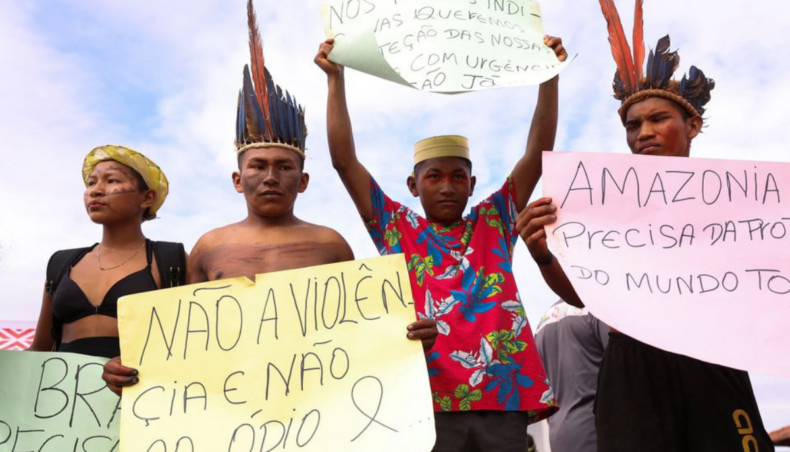On June 11, six tribes from the isolated Javari Valley in Brazil gathered in an assembly hall to mourn the loss of Bruno Pereira, a collective advisor, and Dom Phillips, a British journalist covering his work.
On an Amazon tributary that passes through their reservation, native patrolmen formed by Pereira, a former top official for indigenous relations agency Funai, were still looking for traces of the missing men.
The assembly, on the other hand, had little uncertainty about their fate.
“Bruno died as our shield, guarding us and our territory,” said Manoel Chorimpa, a Marubo tribesman and organizer for the Union of Indigenous Peoples of the Javari Valley (UNIVAJA).
A fisherman who had confronted the indigenous guards admitted to killing Pereira and Phillips three days later.
Shock at their fate has rippled around Brazil and the world, exposing President Jair Bolsonaro’s makeover of the indigenous agency Funai, as well as a rising tide of violence and criminal invasions on the native territory.
“Why didn’t the government intervene before our brother Bruno and the journalist were killed?”.
At the Univaja gathering, Chief Arabonah Kanamari requested fiercely.
“It is now our responsibility to police our own land. Funai has all but abandoned us”.
Brazil President, Bolsonaro’s office didn’t respond to a request for comment, but he has expressed his contempt for Funai and its objective in the past.
He came to office in 2019 threatening to “take a scythe to the throat” of the agency, citing constitutional protections for indigenous areas as a hindrance to development.
Funai’s staff and budget have been slashed since he took office, according to public data.
‘Difficulty to respond efficiently’
According to Indigenistas Associados, a non-profit lobbying group made up of current and former agency workers, the new administration has centralized and slowed down approval for operations, making it more difficult to respond quickly to accusations of unlawful logging, mining, and poaching.
Funai declined to comment on the new policies or the mounting allegations of violence on indigenous reservations.
According to The Missionary Council for Indigenous Peoples, violence against indigenous Brazilians and illegal invasions of their property has increased in the first two years of Bolsonaro’s presidency compared to the previous two years (CIMI).
According to human rights organization Global Witness, the number of murders of indigenous land defenders in Brazil increased to ten in 2019 and 2020, compared to just five in the two previous years combined.
‘Witness to Armed Encounter’
Four patrolmen who observed Pereira and Phillips’ final days told reporters on the condition of anonymity for fear of retaliation, that they were observing the work of indigenous patrols when they drew the notice of a one-armed and irate fisherman.
On June 2, three days before they vanished, Phillips and Pereira met with a vigilance team besides the Itacoai river. Phillips explained that he was working on a book about indigenous attempts to safeguard the Amazon river.
The next day, the two stood by and observed as the patrolmen plotted the river’s many branches, demonstrating how they recorded evidence of illicit fishing and hunting.
On June 4, the team saw Amarildo da Costa, a fisherman, and two other men pass in a boat heading toward their appointment, which is off-limits to outsiders without permission.
Phillips and Pereira, who had no intention of entering the reserve, remained on the sidelines as the indigenous squad pursued Costa’s boat, wearing balaclavas to conceal their identity.
When Costa and his companions saw them approaching, they came to a halt and made frightening motions with two hunting rifles.
The vigilance team withdrew and reported the event to the police, who took no action right away.
Despite the patrolmen’s concerns about their safety, Phillips and Pereira left early the next morning for Atalaia do Norte, a nearby town, according to the patrolmen.
According to a police report seen by Reuters, a witness saw Pereira’s boat first, followed two minutes later by Costa’s. Pereira and Phillips were never seen alive again.
Costa admitted to killing and dismembering the men after being arrested three days later on a firearms allegation, officials said. He led investigators to their bodies on Wednesday.













